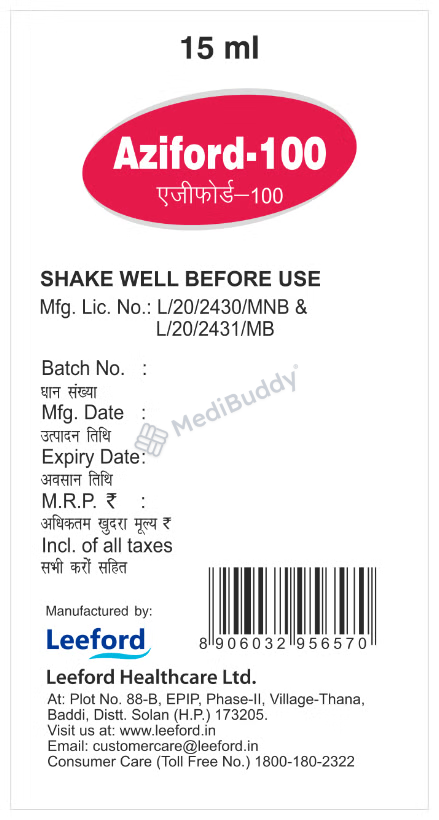Aziford Syrup
By Aziford
Rx
15ml Syrup in a Bottle

Composition
Azithromycin(NA)

Manufacturer - Leeford Healthcare Ltd
Leeford Healthcare Limited , Leo House, Shaheed Bhagat Singh Nagar, Dugri-Dhandra Road, Near Joseph School , Ludhiana-141116

Expires on or after
November, 2025

liver
When using Aziford Syrup, it is important to be cautious if you have liver disease. It may be necessary to adjust the dosage of Aziford Syrup for patients with liver issues. It is advised to seek guidance from your doctor regarding the use of Aziford Syrup to ensure safety.

kidney
Aziford Syrup requires caution in patients with severe kidney disease. Dose adjustment may be necessary. Consult your doctor for proper guidance.

alcohol
It is unsafe to mix alcohol with Aziford Syrup. Avoid drinking alcohol when consuming Aziford Syrup.

driving
When using Aziford Syrup, it is unlikely to impact your driving ability.

pregnancy
Aziford Syrup is thought to be safe during pregnancy. Animal studies indicate minimal negative effects on babies, but human studies are limited.

breastfeeding
Aziford Syrup is considered safe for use while breastfeeding. Studies show the drug is unlikely to pass into breastmilk in harmful amounts, posing minimal risk to the baby. However, be aware of potential side effects like diarrhea or rash.
| Habit Forming | No |
| Chemical Class | Macrolides |
| Therapeutic Class | ANTI INFECTIVES |
| Action Class | Macrolides |
₹50
Inclusive of all taxes
Content verified by

Dr. Gowri Kulkarni
MBBS - General Medicine, DNB - Psychiatry, MRCGP [INT] Family Medicine, BSIC (BACP)
Last update on 11-Feb-2025


